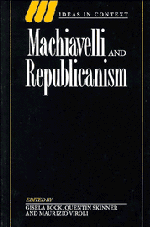Book contents
- Frontmatter
- Contents
- List of contributors
- Acknowledgements
- I MACHIAVELLI AND THE REPUBLICAN EXPERIENCE
- II MACHIAVELLI AND REPUBLICAN IDEAS
- 6 Machiavelli's Discorsi and the pre-humanist origins of republican ideas
- 7 Machiavelli and the republican idea of politics
- 8 The theory and practice of warfare in Machiavelli's republic
- 9 Civil discord in Machiavelli's Istorie Florentine
- III MACHIAVELLI AND THE REPUBLICAN HERITAGE
- IV THE MORALITY OF REPUBLICANISM
- Index
- Title in the series
6 - Machiavelli's Discorsi and the pre-humanist origins of republican ideas
Published online by Cambridge University Press: 05 July 2011
- Frontmatter
- Contents
- List of contributors
- Acknowledgements
- I MACHIAVELLI AND THE REPUBLICAN EXPERIENCE
- II MACHIAVELLI AND REPUBLICAN IDEAS
- 6 Machiavelli's Discorsi and the pre-humanist origins of republican ideas
- 7 Machiavelli and the republican idea of politics
- 8 The theory and practice of warfare in Machiavelli's republic
- 9 Civil discord in Machiavelli's Istorie Florentine
- III MACHIAVELLI AND THE REPUBLICAN HERITAGE
- IV THE MORALITY OF REPUBLICANISM
- Index
- Title in the series
Summary
By the end of the twelfth century, a distinctive system of republican government had come to be well established in most of the major cities of the Regnum Italicum. The cities were generally controlled by chief magistrates known as podestà, so called because they were vested with supreme power or potestas over the citizens under their charge. A podestà normally held office for a period of six months or at most a year, and conducted his administration by means of a series of executive councils. All the members of such councils, including the podestà himself, enjoyed a status no higher than that of public servants of the commune that elected them. The system thus represented a complete repudiation of the familiar Medieval principles of lordship and hereditary rule.
Scholars have generally agreed, however, that the cities initially failed to develop anything in the nature of a corresponding civic ideology. They altogether lacked the means to conceptualise and legitimate their elective and self-governing arrangements. This development had to await the recovery and dissemination of Aristotle's moral and political theory in the latter part of the thirteenth century. Aristotle's Politics in particular ‘provided a unique key to the new world of urban polities’, whereas ‘no such guide had existed before the rediscovery’ of his texts. It was thus ‘the politics of the polis’ that came to be ‘cardinal to the constitutional theory of Italian cities’.
- Type
- Chapter
- Information
- Machiavelli and Republicanism , pp. 121 - 142Publisher: Cambridge University PressPrint publication year: 1991
- 13
- Cited by

